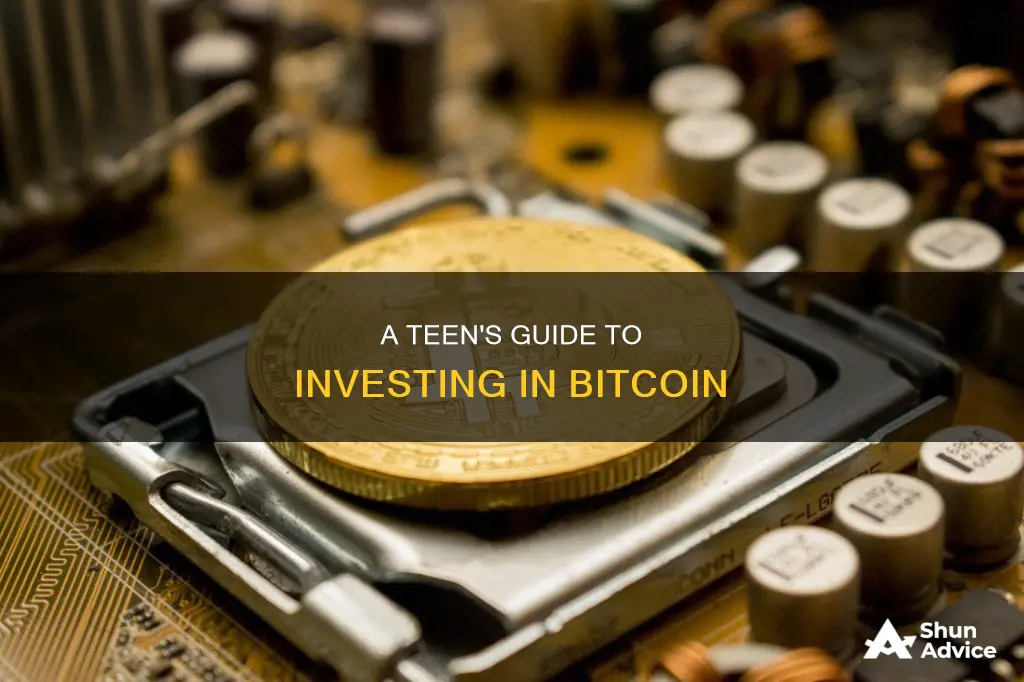
Bitcoin and other cryptocurrencies are increasingly popular, especially among younger generations who see them as the future of finance. While there are no laws preventing minors from investing in cryptocurrencies, many crypto exchanges require users to be 18 or over. So, what are the options for under-18s wanting to invest in Bitcoin? One way is for a parent or guardian to set up a custodial account, which they manage on the child's behalf. Alternatively, teens can use a decentralised exchange, which doesn't require registration, or a Bitcoin ATM. However, it's important to remember that crypto investing is high-risk and mostly unregulated, so it's not a decision to be taken lightly.
| Characteristics | Values |
|---|---|
| Legality of minors investing in cryptocurrencies | There are no laws or age limits preventing minors from investing in cryptocurrencies, but many exchanges require users to be 18+ |
| Parental involvement | Parents can help minors buy their first crypto portfolio, invest in educational courses, or open a custodial account |
| Crypto wallet options | Minors can only open a decentralised crypto wallet, but these are unregulated and don't allow the exchange of fiat currency for crypto |
| Risks | Crypto is a high-risk and volatile investment with a lot of regulatory uncertainty |
What You'll Learn

Crypto custodial accounts
If you are under 18, you cannot buy financial assets on your own. Adults, typically your parents, have to establish custodial accounts for you. They can manage the purchasing of the assets on your behalf, but you generally won't gain control over the assets until you are over 18 years old.
A custodial account is where a third party, such as a cryptocurrency exchange, takes custody of your private keys and controls your cryptocurrency. This means that the third party has full control over your crypto assets and is responsible for managing your wallet key, signing transactions, and protecting your crypto assets. Most custodial wallets are web-based exchange wallets, and they are available from crypto exchanges or a custodial wallet provider in the form of a mobile or web app.
While a custodial wallet may be considered less secure than a non-custodial wallet, many prefer them because they don't require as much responsibility and are usually more convenient. Losing your password to a non-custodial wallet could be financially devastating if you do not take sufficient precautions. However, if you forget your exchange account password, you will likely be able to reset it.
Custodial wallets are a good option for those who want ease of use and backup recovery options. However, it is crucial to use a reputable custodial wallet, such as those offered by major U.S. crypto exchanges, where the majority of customer funds are held in cold storage hardware wallets and highly secure.
Bitcoin Investment Trust: Tracking Bitcoin's Price
You may want to see also

Crypto wallets
There are two main types of crypto wallets: hot wallets and cold wallets. Hot wallets are connected to the internet and are often available as a standalone product or as an add-on through popular crypto exchanges. They make it easy to execute crypto transactions but are more vulnerable to hackers. Cold wallets, on the other hand, are not connected to the internet and are typically hardware devices, such as USB drives, that store your private keys offline. They are more secure than hot wallets but are less convenient to access and are susceptible to loss or destruction.
Hot Wallets
- Coinbase Wallet - Best for beginners, with a user-friendly interface and support for over 100,000 digital assets.
- MetaMask - Best for Ethereum, with an intuitive interface and support for thousands of decentralised apps (dApps).
- TrustWallet - Best for mobile, with support for a vast range of coins and tokens and a built-in Web3 browser.
- Electrum - Best desktop Bitcoin wallet, with extensive security features and high customisability.
- BlueWallet - Best mobile Bitcoin wallet, with a modern design and support for both on-chain and lightning transactions.
- Exodus - Best for desktop, with native support for over 270 crypto assets and compatibility with Trezor hardware wallets.
- Crypto.com - Best DeFi wallet, with a variety of decentralised finance tools and excellent security features.
Cold Wallets
- KeepKey - Best cold wallet for beginners, with support for over 7,000 cryptocurrencies and an easy-to-read digital display.
- Ledger Nano S Plus - Best hardware crypto wallet, with support for a large number of assets and tight security.
- SafePal - Best hybrid crypto wallet, offering both software and hardware solutions and supporting over 10,000 cryptocurrencies.
When choosing a crypto wallet, it is important to consider factors such as security, functionality, and cost. Additionally, active traders may benefit from having both a hot wallet for frequent transactions and a cold wallet for long-term storage.
Cashing Out Your Bitcoin Investments: A Step-by-Step Guide
You may want to see also

Bitcoin ATMs
There are two types of Bitcoin ATMs: one-way and two-way. A one-way ATM allows customers to buy cryptocurrencies, while a two-way ATM enables customers to buy and sell Bitcoin. These ATMs also allow customers to buy or sell cryptocurrencies by connecting directly to a cryptocurrency exchange. Most Bitcoin ATMs accept cash, but some also accept credit and debit cards.
To buy Bitcoin from a Bitcoin ATM, follow these steps:
- Enter the amount to purchase. Depending on local regulations and the amount, you may need to verify your identity.
- Provide your Bitcoin wallet address by using the ATM's camera to scan the QR code of your Bitcoin wallet address displayed in your Bitcoin wallet app.
- Pay using cash, credit card, payment app, or other accepted methods.
- Receive the Bitcoin in your Bitcoin wallet. This generally takes a few minutes, and the ATM will provide a transaction ID to monitor the purchase status.
To sell Bitcoin from a Bitcoin ATM:
- Enter the amount to sell. Depending on local regulations and the amount, you may need to verify your identity.
- Send Bitcoin to the provided address by scanning the QR code of the provided address and sending the Bitcoin using your Bitcoin wallet app.
- Take your cash. Once the ATM receives the Bitcoin, it will dispense the cash, usually within a few minutes. You can monitor the transaction status using your Bitcoin wallet app.
As of September 2021, there were over 24,700 Bitcoin ATMs in the US, with tens of thousands more worldwide. Some providers of Bitcoin ATMs include Coinhub, Lowest Fee Bitcoin ATMs, Byte Federal, Coinme, CoinFlip, Cash2Bitcoin, and Bitstop.
Bitcoin Derivatives: A Guide to Investing and Trading
You may want to see also

Peer-to-peer exchanges
Peer-to-peer (P2P) trading is a method of exchanging cryptocurrency that allows crypto investors to transact directly with each other without the need for a centralised third party to facilitate transactions. While traditional bitcoin exchanges impose stricter laws and require users to prove their identity before they can access and use the platform, P2P trading platforms are much more relaxed in their requirements.
One example of a P2P exchange is LocalCryptos, which is among the world's trusted peer-to-peer crypto marketplaces. Buying Bitcoins with this platform is super easy and protected by escrow. Other P2P exchanges include LocalBitcoins, Bisq, HodlHodl, and Paxful.
It is important to note that, while P2P exchanges do not require KYC verification, they may still be risky. For example, if you are meeting someone in person to buy or sell Bitcoin, there is a chance that you could be scammed or robbed. Therefore, it is important to exercise caution when using P2P exchanges and only meet in public places or use trusted platforms with built-in escrow services.
In addition, it is worth mentioning that P2P exchanges typically have lower liquidity than traditional exchanges, which can result in higher fees and slower transaction times. However, for minors who are unable to access traditional exchanges due to age restrictions, P2P exchanges can be a viable option for buying and selling Bitcoin.
Cash App Bitcoin Investing: A Beginner's Guide
You may want to see also

Getting crypto payments for work
Getting paid in cryptocurrency for work or freelancing is a great way for young people to get involved in the world of crypto. There are several ways to get paid in crypto for work, and it is becoming increasingly popular.
Firstly, there are many freelance platforms that offer jobs that pay in Bitcoin or other cryptocurrencies. These include XBT Freelancer, Coinality, and Crypto Jobs, to name a few. These platforms offer a range of jobs, from writing and translation to web design and development.
Another way to get paid in crypto for work is to find part-time jobs in the IT and crypto fields. These industries are always on the lookout for young talent and often pay well in cryptocurrency. You can also find remote jobs with startups that use blockchain technology, which can be a great way to get involved in the industry and earn crypto.
Additionally, some companies now offer to pay their employees in cryptocurrency. This trend has been picked up by celebrities and is becoming more popular among younger generations. Getting paid in crypto by your employer can give you more control over your compensation and allow you to maintain sovereignty over your assets. It also eliminates the need to rely on the banking system.
However, it's important to remember that getting paid in crypto comes with certain risks and complexities. The value of cryptocurrencies can fluctuate, and there can be tax implications and compliance issues to consider. It's also important to use a secure cryptocurrency wallet and be cautious of scams.
Overall, getting paid in crypto for work or freelancing can be a great way to get involved in the world of crypto and take advantage of the benefits it offers. However, it's important to do your research and understand the risks involved.
Myanmar's Bitcoin Investment: A Beginner's Guide
You may want to see also
Frequently asked questions
The safest way to buy Bitcoin if you're under 18 is with the help of an adult, usually your parents. They can set up a custodial account for you, which they manage on your behalf. You will not be able to gain control over the assets until you are over 18.
You will need to choose a decentralised cryptocurrency wallet option to open a wallet. However, you will need the help of your parents to place or withdraw cryptocurrency.
Yes, a minor can own Bitcoin if their parents open a Bitcoin account for them.
There are several ways to buy Bitcoin without the help of an adult, but these are risky and not recommended. You could use a Bitcoin ATM, a peer-to-peer exchange, or a decentralised exchange.







